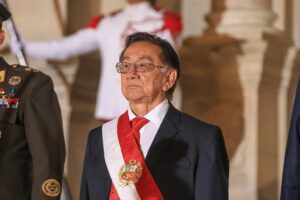
Published 12/04/2023 17:44 | Edited 12/05/2023 16:41
The incorporation of the Essequibo region, now part of Guyana, into the territory of Venezuela obtained, according to official figures, 95.93% of the votes in the plebiscite held this Sunday (3) by the government of Nicolás Maduro. Brazilian diplomacy spoke out after the result, stating that they hoped the issue would be resolved peacefully.
The statement was given this Monday morning (4) by the secretary of Latin America and the Caribbean of the Brazilian Ministry of Foreign Affairs, ambassador Gisela Padovan. She also highlighted that Brazil maintains “high level” dialogue with both countries.
According to Gisela, the fact that Venezuela is suspended from Mercosur does not hinder conversations to articulate a solution. “No. We continue to move forward,” she said. Furthermore, the ambassador stated that the plebiscite is an internal matter for Venezuela.
According to the Venezuelan National Electoral Council (CNE), 10.5 million voters participated in the referendum, of which 95.93% agreed to officially incorporate Essequibo into the country’s map and grant citizenship and identity documents to the more than 120 thousand Guyanese who live in the country. territory.
Laws also: Referendum in Venezuela challenges diplomacy in dispute with Guyana
Shortly before the consultation took place, President Luiz Inácio Lula da Silva declared, still in Dubai, where he participated in COP 28: “If there is one thing that South America does not need right now, it is confusion”. And he added: “You can’t keep thinking about fighting. I hope that common sense prevails, on the side of Venezuela and Guyana.”
The territory of Essequibo, which accounts for more than 70% of Guyana, is rich in minerals and precious stones and has been in dispute between the two countries for more than a century.
Venezuela questions the Paris Arbitration Sentence of 1899, which decided to withdraw the region from its territory. Since the 1960s, the Venezuelan government has sought the cancellation of the Paris arbitration at the UN, seen as disadvantageous for the country. The 1966 Geneva Agreement, established to seek a peaceful solution, is mentioned as the only valid legal instrument for the impasse.
The International Court of Justice (ICJ) entered the controversy in 2020, after declaring itself competent to recognize Guyana’s request, based on the 1899 arbitration award. However, Venezuela refuses to recognize the jurisdiction of the ICJ, maintaining its position of seek a peaceful solution based on the Geneva Agreement.
With agencies
(PL)
Source: vermelho.org.br

